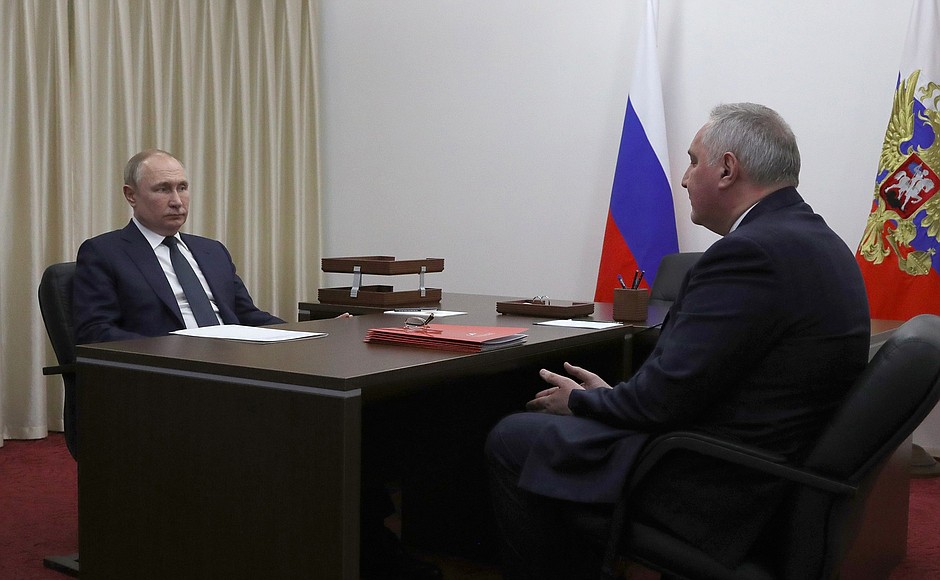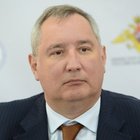
President of Russia Vladimir Putin: Mr Rogozin, we have been discussing the development of the industry all day. Let us continue.
Roscosmos General Director Dmitry Rogozin: My pleasure, Mr President.
If I may, I would like first to report on some points related to the sanctions: what we think about their influence on our industry; to what extent we are ready to accept them, and what the main results of our import substitution programmes are.
In principle, we understood that these sanctions would be imposed in one way or another. It must be said that some time ago the United States adopted an act that was simply kept under moratorium. According to this act, starting January 1, 2023, any space vehicle with any US-made component or microchip cannot be launched into space on a Russian carrier rocket or from a Russian cosmodrome, even if our rocket takes off from another space port, notably in French Guyana. So, these were deferred sanctions, as it were.
Moreover, a year ago the United States announced sanctions against some strictly civilian organisations. Take our leading flagship institute – the Central Engineering Research Institute (TsNIIMash) established by Sergei Korolev. It includes the Flight Control Centre. Paradoxically, this is Houston’s counterpart in ensuring the safety of the International Space Station, but it too was subjected to sanctions. This was a year ago.
Sanctions against the Progress Rocket Space Centre were introduced in a similar way. It is our leading producer of Soyuz-2 rockets that you saw today in the assembly and testing facility.
Vladimir Putin: These are simply attempts to hold back our development.
Dmitry Rogozin: Absolutely. There was no other logic.
So, the new sanctions by the European Union and the Canadian Space Agency looked identical, carbon copies, and not even related to our military organisations, the ones that are part of Roscosmos and engage in creating intercontinental ballistic missile systems. The sanctions do not apply there, and these combat missile systems do not need visas, as you know. But for civil organisations these sanctions were identical.
We decided – I reported on this to you – to respond to these sanctions primarily in two areas rather than sit on our hands. First, to stop the delivery of our rocket engines, maintenance of the RD-180 engine that launches the US Atlas V rocket, and the RD-181 engine that launches the first stage of the Antares rocket and the US cargo ship Cygnus.
In addition, we have suspended OneWeb launches. After the British government became a shareholder and after the statements that the British government had made about Russia and the moves by their leaders, we turned to OneWeb with a proposal that the British government leave the ranks of the shareholders and, second, that they give us guarantees that this group would not be used to support the armed forces of Ukraine.
Of course, we knew how things really were, but we wanted to obtain at least some guarantees from our customer, and we provided regular services with regard to commissioning multiple spacecraft. When this failed to materialise, I decided to take the rocket off the launch pad. On March 5, the launch from Baikonur was canceled, and we severed our relations with that company, which, I believe, will lead them to bankruptcy, because the Europeans and the British do not actually have booster rockets that can maintain the launch campaign.
With regard to the sanctions and their impact on our industry, you saw the Vostochny Cosmodrome today. It is doing well despite the sanctions. We had only one weak spot, the so-called compressed gas cylinders, which we used to buy from South Korea. However, I am here to report that the Nizhny Novgorod Region, the governor and I are in communication, launched the production of these cylinders, so we have replaced the imports here in full. This is what concerns the spaceport. Everything else is just fine.
Booster rockets. In 2019, we replaced the Ukrainian-made control system on the Soyuz-2 rocket, which was called Soyuz-FG. Since then, we have been using our carriers that do not have any imported parts. The control system, the engines, fuel tanks, oxidizer tanks and the entire hull are manufactured in the Russian Federation.
Moreover, when creating the Soyuz-5 rocket at the Progress Rocket Centre in Samara, we purchased new welding machines and converted from argon-arc welding to friction welding. We located a company that manufactures this equipment in Russia. The company Sespel in Chuvashia presented high-quality equipment, which is already being installed in the Samara Rocket Centre’s workshops.
I reported to you about the engines already. We export them, so there is no question about dependence whatsoever. They are dependent on us, not the other way round.
We have a problem that we are well aware of, we have had it since the sanctions for Crimea were imposed in 2014. It is about supplies of special-purpose radiation-resistant microelectronics, which are used in 95 percent of spacecraft.
Mr President, we are on top of this. We have accomplished a lot lately. We created a holding company for space instrumentation engineering and design centres. We work on the so-called foundry principle where we order a ready-made microchip. Just before the sanctions, we bought the privately-owned Yaroslavl Radio Plant, and now we have a mass production company that supplies us with space instruments.
We have resolved two issues, which I reported to you about in Sochi and in Moscow, the high-speed radio link and traveling wave tubes. Indeed, there are, unfortunately, delays and we agree with the criticism, but there will be no disruptions. We will spend some time reviewing circuit design solutions with the general designer and we will then own it, and it will stay in the country.
So, Mr President, there is no reason to worry about the rocket and space industry. There are many challenges, but we do not have to deal with the problems that, unfortunately, our colleagues have. We will continue to work as we did before, and we will ensure all federal launches this year. We will continue to commission spacecraft next year as well. Just last week we completed the work that we committed to with regard to spacecraft for the Defence Ministry. So, I think we are up to the challenge.
Vladimir Putin: Good. Let us talk about the industry.
<…>
